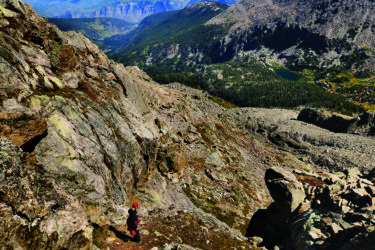The Local newsletter is your free, daily guide to life in Colorado. For locals, by locals.
Over the course of two months during the summer of 2006, Evergreen’s Alpine Rescue Team (ART) recovered 10 dead bodies. Tom Wood, one of the group’s members, remembers the toll that exposure to trauma exacted on the squad. Morale was low. Volunteers became irritable or avoidant. Some even quit.
At the time, Colorado search and rescue (SAR) teams didn’t fully understand the mental health impacts that the job, which is done almost entirely by volunteers, could level. Dealing with death was part of the gig, Wood says; if you couldn’t handle it, you weren’t cut out for the work. However, an increased recognition of how psychological stress injuries develop is forcing the SAR community and the local governments they serve to realize that “toughening up” isn’t a prescription for good mental health. And with Colorado’s roughly 50 SAR teams responding to around 3,000 calls in 2019—a number that has significantly increased in recent years, likely due to rising backcountry traffic—those groups are looking for ways to help.
Emotional stress injuries work like physical stress fractures: The more trauma a person experiences without adequate recovery, the more likely they are to develop more serious problems. For SAR volunteers like Wood, the strain comes not only from the grisliest incidents, such as recovering dead bodies after accidents or suicides, but also from long, fruitless searches for missing people. “It’s not realistic that [what you see] will never bother you,” Wood says. “I would be on my daily commute, getting really, really angry with the drivers around me—and they weren’t driving any worse or any better than they had in the months before.” Most volunteers also work full-time jobs yet still get called out on nighttime missions, which disrupt their sleep and deplete their internal abilities to deal with what they’ve experienced.
Those side effects can divide SAR members from loved ones and activities they once enjoyed and also lead to depression. Yet, because of workers’ compensation restrictions, most volunteers don’t receive reimbursement for health care or mental health services. If they seek professional help, they typically pay for it themselves.
Recently, however, Colorado SAR teams have begun working to change that. In 2019, Rocky Mountain Rescue Group in Boulder launched a resiliency plan; Evergreen’s ART did the same this past May. Both plans were developed with the help of Laura McGladrey, a nurse practitioner at UCHealth University of Colorado Hospital in Aurora. “How do you build resiliency?” asks McGladrey. “Strong bodies, sleep, movement, good food, connection with others, space for integration in the form of meditation or some downtime. We work on building those into people’s lives.”
While such programs remain a rarity, some Colorado legislators are trying to expand the safety net. Earlier this year, the state Senate, in collaboration with the Colorado Search and Rescue Association, introduced a bill seeking to address the challenges associated with search and rescue, including its psychological consequences. (The bill stalled in committee when the legislative session was shortened due to COVID-19, but it will likely be reintroduced next year.) The hope? That in the future, Coloradans are just as prepared to help SAR teams as SAR teams have been to help Coloradans.









